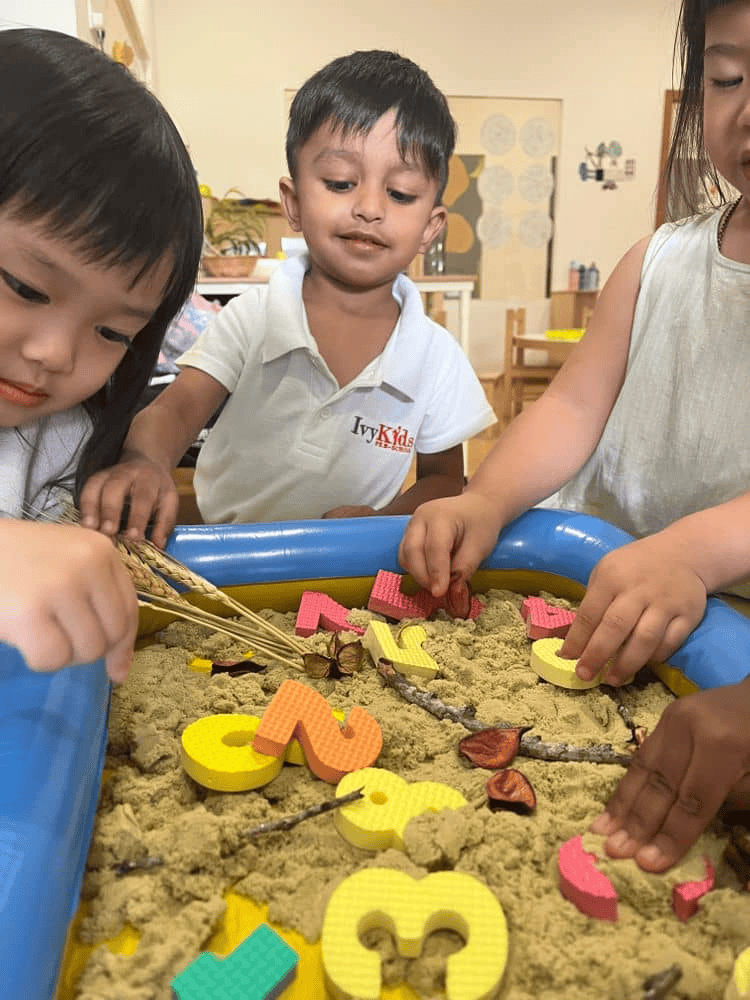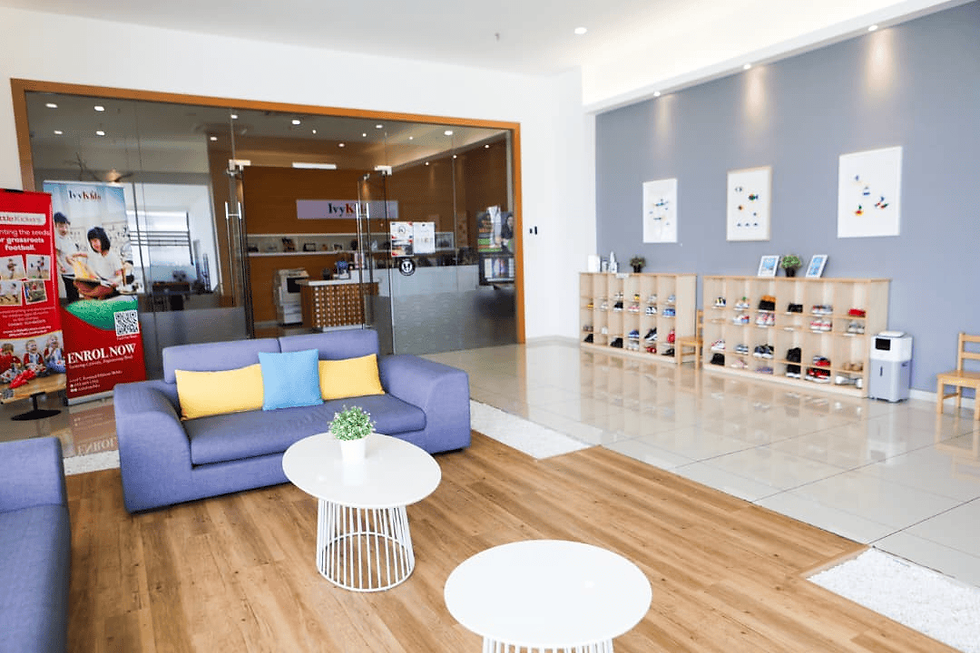Unlocking Child’s Potential Through Play-based Learning at Pre-school
- Ask Ivy
- Oct 16
- 5 min read
Updated: Oct 26

What You'll Learn in This Guide
As a parent, choosing the right pre-school feels like stepping into a new world — one filled with hope, questions and dreams for your child. In this article, we invite you on a journey through the wonder of play-based learning pre-school environments. You’ll discover what a play-based school is, why learning through play matters so much in early years, and how Ivy Kids Pre-School Melaka brings this philosophy to life.
We’ll also share examples of play-based activities for pre-schoolers that you can enjoy at home, and show you how our approach prepares your child not just for school, but for a lifetime of curiosity and confidence.
Table of Contents
They say children learn most when they are playing, and there is real truth in that. In a play-based learning pre-school, children do more than just “play.” They explore, imagine, create, experiment: All under the gentle guidance of caring teachers.
From stacking blocks to pretending to be explorers, these play experiences support early literacy, numeracy, social skills, and emotional growth. In a play and learn pre-school environment, curiosity becomes the engine of learning. Children discover at their own pace, make mistakes, try again, and gradually build understanding.
“The child has a hundred languages, a hundred hands, a hundred thoughts, a hundred ways of thinking, of playing, of speaking… Nothing without joy.”
— Loris Malaguzzi, founder of the Reggio Emilia approach
Play is not simply fun. It is meaningful, powerful, and central to how children understand the world.
What is a Play-based Learning School?
A play-based school designs its environment, materials and daily routines around the idea that children learn best when they are actively engaged in play. But make no mistake, this is not “unstructured play” without purpose. Rather, it is intentional play, guided by teachers who observe, intervene sensitively, and scaffold learning.
Here is how it works in practice:
Children choose their play, explore freely, or join in guided experiences.
Educators thoughtfully plan provocations (small challenges or prompts) that invite inquiry and discovery.
Over time, play gradually introduces more structured concepts (like early maths or science) in ways that make sense to the child’s evolving world.
The play environment itself is like a third teacher: materials, spaces, and time are arranged to encourage exploration and experimentation.
This approach aligns beautifully with how young minds develop: children don’t absorb information by sitting still but they discover it through movement, curiosity and hands-on interaction.

The Core Benefits of Play-based Learning for Pre-schoolers
When children engage in purposeful play, a host of developmental gains unfold:
Cognitive Growth
Through puzzles, building, experimenting, and storytelling, children develop reasoning, problem-solving, and early concepts like number sense, patterns, and cause & effect. In fact, a 2024 study published on ResearchGate found that the Reggio Emilia approach significantly improved pupils’ critical thinking skills and mathematics achievement, highlighting how play-based and inquiry-driven methods can foster academic success alongside creativity.
Social & Emotional Development
Play is a natural laboratory for cooperation, empathy, negotiation, and self-regulation. Children learn how to share, resolve conflict, and see things from another’s perspective.
Language & Communication
In role-play, storytelling, and conversation, vocabulary blooms. Children practise listening, asking questions, and expressing ideas.
Physical & Sensory Development
Building, sculpting, climbing, and manipulating small objects all strengthen gross and fine motor skills. Sensory play (sand, water, textures) supports concentration and attention.
Confidence & Resilience
In a safe play space, children test ideas, fail, recover, and try again. They see themselves as capable learners, which fosters persistence and a growth mindset.
As one might say, when children engage wholeheartedly, what seems like “child’s play” is actually serious learning and sometimes it’s child’s play in the literal sense of the idiom.
Ivy Kids Pre-School Melaka’s Approach to Play & Learn Pre-school
At Ivy Kids Pre-School, we don't just pay lip service to play, we live it. Inspired by the Reggio Emilia philosophy and strengthened by the Cambridge Early Years Foundation Stage (EYFS), our approach gives children the freedom to explore while ensuring strong foundations in literacy, numeracy, and enquiry skills.
Reggio Emilia celebrates the child’s voice and sees the learning environment as an active participant in education. It is centred on the belief that children are capable, curious, and full of potential.
Cambridge EYFS ensures progression in literacy, numeracy, science and enquiry skills.
Here is how play is woven daily into our programme:
A child might discover the concept of weight and balance by stacking blocks or exploring water play.
In a role-play corner, children might act out stories or daily life scenarios, enriching language and social skills.
Outdoor play allows children to interact with nature by digging, planting, observing and learning about their environment.
Music, art, and movement become opportunities for self-expression, experimentation, and emotional development.
By blending Reggio Emilia’s child-centred philosophy with Cambridge EYFS’s structured learning progression, Ivy Kids Pre-School creates a play-rich environment where curiosity and confidence flourish side by side.
Practical Play-based Activities for Pre-schoolers
Here are some gentle, effective ideas for play-based activities for pre-schoolers that parents and teachers alike love:
Imaginative or Pretend Play: Let children role-play supermarkets, doctor’s office, or stories. This fosters language, empathy, and creativity.
Construction Play: Blocks, LEGO, magnetic tiles. These develop spatial reasoning, concentration and planning.
Sensory Bins: Fill trays with rice, sand, water, beads. Then add scoops, spoons, cups. Here children can experiment with textures and quantities.
Outdoor Discovery: Nature walks, leaf collecting, bug hunts. The children can become little scientists, asking “why” and observing change.
Creative Arts & Movement: Free painting, clay, dancing. This allows children time to express themselves without fear of “doing it wrong.”
Each of these experiences lays the groundwork for thinking, talking, feeling, and moving with confidence. Even simple games like “show and tell” help with storytelling and speaking in front of others.
Embracing Play for Lifelong Learning with Ivy Kids Pre-School Melaka
Choosing a pre-school is more than a logistical decision. It is a declaration of belief in how children learn best. A play and learn pre-school nurtures the whole child, not just academic skills. It fosters joy, curiosity, and confidence from the very first day.
At Ivy Kids Pre-School, we invite you to see how our approach helps children blossom, not by pushing them, but by guiding them gently through inquiry, exploration and reflection. Because when children are free to play, they often surprise us with their insight, creativity and wisdom.
Would you like to tour our play-rich environments, meet our passionate teachers, or see children in action? We’d love to welcome you. Contact us to learn more.
Resources
Pen Name: Ask Ivy
Early childhood educator and passionate advocate for play-based learning, Ask Ivy writes about the magic of curiosity, creativity, and growth at Ivy Kids. She believes every child blossoms in their own unique way, with care, encouragement, and joyful exploration.




Comments